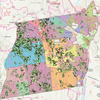State working to get new farmer mental health service off the ground
Enterprise file photo — Marcello Iaia
The Patroon Land Farm, in Knox, seen from overhead. New York State is working to start a new program called Farmers Supporting Farmers that will provide mental health resources along with technical assistance as farmers continue to navigate significant challenges in the industry.
NEW YORK — To combat faltering mental health among agricultural workers, New York State is hoping to start a new program called Farmers Supporting Farmers that aims to give farmers psychological support while also addressing job factors that may be contributing to their stress.
The Office of Mental Health is currently soliciting proposals to choose an agency “with statewide capacity to deliver peer-driven, culturally responsive services to farmers and agribusiness workers and families, including technical assistance to support business and financial needs and wellness supports to promote mental health needs,” according to its request-for-proposals document.
The winner of the award will receive a five-year, $2 million contract for services.
The office notes that farmers are still dealing with fallout from the COVID-19 pandemic — rising labor costs, supply-line issues, etc. — on top of the general stress of the agricultural industry, which puts them at high risk for stress-related health issues.
Beyond that, office says, rural communities face four main obstacles to health supports, namely:
— Availability of health professionals;
— Accessibility of existing services, which may be harder for rural residents to get to;
— Affordability of these services; and
— Acceptability, or stigma associated with receiving mental-health support.
The Centers for Disease Control and Prevention says that, over the past two decades, rural Americans have been at significantly higher risk of suicide than urban Americans. Rural residents are also typically more prone to drug overdoses despite drug use being more prevalent in urban areas, the CDC says.
At the same time, though, efforts to support rural residents have not always worked. Albany County, for instance, shut down the satellite counseling center it operated in the Hilltowns due to lack of use.
Both candidates for the 102nd Assembly seat last November, Republican Chris Tague and Democrat Janet Tweed, emphasized the need for more support during their campaign interviews with The Enterprise.
“We can’t arrest our way out of this problem,” Tague, who won the election, had said. “We need much more counseling … We need to put pressure on insurance companies. They can’t just cover people with these alcohol and drug diseases for nine-, 12-month periods of time. There has to be coverage for 24 months at least.”
The county has adapted to rural needs by developing the Albany County Crisis Officials Responding and Diverting (ACCORD) program, which sends social workers on certain emergency calls to handle mental health issues that may be a factor.
Stephen Giordano, Albany County Mental Health Commissioner, told The Enterprise this week that the county launched the program in the rural Hilltowns in 2021 “because we knew that the response time for the Mobile Crisis Team was lengthy to respond to the Hilltowns and because we knew there were few other options in the rural communities.”
Likewise, the state Office of Mental Health says that an “innovative” approach to supporting rural residents across the state is needed.
The request for proposals outlines three objectives that the chosen agency will need to meet.
The first is to offer free and confidential consulting services statewide, with both virtual and in-person site visits to homes, farms, and other agricultural facilities. The consulting service will provide both technical assistance — business planning, optimization, etc. — as well as mental and behavioral health support, which includes things like family conflict resolution, stress management, and more.
Consultants will also make referrals where useful.
The second objective is to launch a helpline that will be available during normal working hours with an afterhours answering service.
The third objective is to provide community outreach, “including providing free workshops, trainings, and targeted outreach conferences focused on the mental health and financial well-being needs of the target population, including suicide prevention,” the request says.
Proposals are due on March 6 this year, and the winner is expected to be named in April with an anticipated contract start date of July 1.



